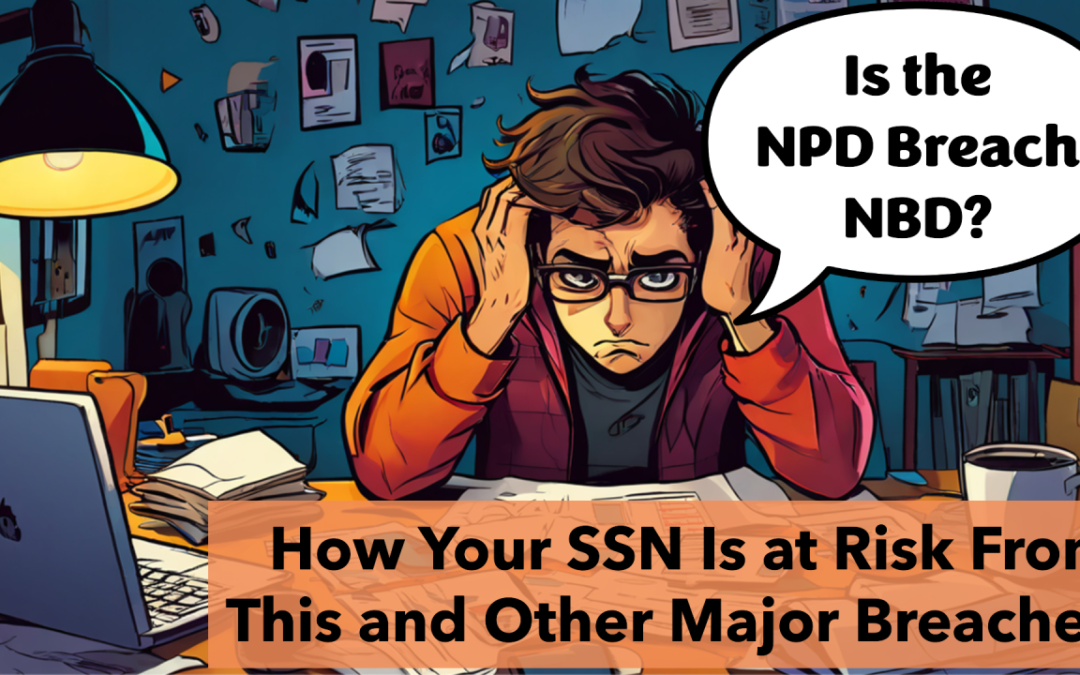Where do you start with Personal Cyber or Identity Theft Protection? I’ve been getting this question more and more. Agencies I’ve been talking to are noticing the trend:
- Our data is out there due to breach after breach, and it’s only a matter of time before it gets used against us.
- Threat actors are targeting us (especially the elderly and minors) with sneaky social engineering attacks and using AI to get better and faster.
- The fear of ID Theft, Fraud, and the hassle of recovery are on more and more people’s minds.
- With cyber liability becoming more crucial for businesses, offering coverage for individuals makes good sense.
What do people need? And is it a viable option in today’s market? Let’s dig into it in today’s article!
What Do People Need to Protect?
For individuals, cyber threats and fraud risks can be similar to the cyber risks businesses face. It’s easier to start with the “What if I have an incident?” perspective and look at the CIA Triad of Cybersecurity for three easy categories to consider:
- Confidentiality: What data do I need to keep protected, and where is it?
- Integrity: What do I trust, and what if that trusted resource becomes compromised?
- Availability: What technology do I rely on, and what does it mean if it’s not there?
When thinking about home and family, consider these questions:
- Is sensitive data about me out there? What is out there? Is anyone using it?
- Could someone hack my computer or another account? What would they do if they did?
- If I trust a scammer by mistake, can I get any lost money back?
- If someone pretends to be me and accesses my accounts, how do I get my money back and restore my identity? How long will it take, and what do I do in the meantime?
It all comes down to monitoring for suspicious activity and recovering by restoring my identity and getting my money back. The second component is preventing this from happening, which involves awareness, security tools, and being cautious.
The good news is that the same types of coverage that provide monitoring and recovery often offer resources to help individuals reduce their chances of falling victim. Even when we do a good job of protecting ourselves, identity theft can still happen. This is why having protection and recovery services is crucial for everyone.
What Is Often Covered?
When looking into Personal Cyber or Identity Theft Protection, ensure your coverage includes three core capabilities:
- Detect, Monitor, and Alert: Every second counts, so knowing about suspicious activity quickly helps minimize damage. You need a service that can watch for misuse of your information and alert you promptly.
- Recover: Fixing your identity can take time and often pulls people away from work. You may need to change bank accounts, social security numbers, or other items related to your identity and accounts to protect yourself. Repairing your credit or getting money back can be stressful and difficult without experience. A team doing this on your behalf helps you get your life back to normal faster.
- Insure Against Loss: Recovering your identity can be costly. Expenses can mount up, and it can take weeks to get frozen bank accounts active again. Reimbursement insurance can help cover expenses related to restoring your identity.
The level of service behind these capabilities may vary from policy to policy. Many offerings have different levels of coverage offered at various prices to give consumers options. In addition to coverage, consider a few other areas to compare to find the right offering for you:
- Options for consumers (Levels of coverage, Family or Individual options, Group options for Employer Paid or Voluntary, and resources or services available to consumers)
- Price
- Minimum Group Size (when offered to individuals as a group benefit)
- Minimum Book Size
- Commission
- Reseller Costs
- Ease of Enrollment
- Reseller Tools and Resources
- Exclusivity (can you only have one option?)
How Do You Roll It Out?
Depending on the offering you choose, many agencies can find quick wins. I work with defend-id to help agencies become resellers, and here are three strategies I always recommend:
Personal Lines
Start with an announcement and content that will draw in quick wins with your current book of business and give you a good reason to advertise to current prospects. A webinar can bring awareness to the current risks of ID theft and fraud, how attacks happen today, and ways to help people protect themselves with tips, resources, and your new offering. Follow up with articles, newsletters, or tips shared through social media or other channels. For those who don’t engage initially, create a drip marketing or call campaign to share tips and build awareness so they’re primed to consider it upon renewal. Since this type of coverage can be sold to a business as a group benefit, create a referral system to get individuals discounted or paid-for coverage through their workplace.
Groups
If you already sell benefits and don’t offer Personal Cyber or Identity Theft Protection, you may find this easy to add. Many businesses don’t offer it yet, but it can add value for employers since identity theft impacts them too. Employees miss work, are stressed, and it affects others around them. There’s a good incentive for businesses to invest in this for their employees. Ask, “Should we include ID Theft Protection and Recovery?” Employer-paid rates can be as cheap as a cup of coffee per employee per month, so many people are open to it and want it for themselves. If they say no, offer the Voluntary option: “No problem! We have a voluntary option where the employee can get it at a discounted price.”
Cyber Liability
Consider leveling up your cyber liability offer by adding coverage for individuals at the business. If businesses are protecting themselves from cyber risks, one of their biggest challenges is culture. To change the culture, get employees bought in. Investing in them through personal cyber or Identity Theft Protection coverage gets their attention. By adding this, the business can say: “We are building a smarter culture around cybersecurity and want to start by investing in protecting you at home. Our company will provide coverage to help you detect and monitor for suspicious activity and services that will help you recover your identity if needed. This also gives you access to resources to learn how to protect yourself at home. In return, we ask you to take what you learn and apply it here. Help us protect the company and your coworkers from cyber threats by taking part in our training and supporting necessary changes to be safer.”
This approach not only helps change the business’s culture but also adds value to your cyber liability offering without much cost.
Is It Worth It?
I can’t speak to other offerings outside of defend-id, but here are some figures around the value of this kind of offering:
- defend-id’s average group size is 65 employees, with an average rate of $5/employee/month or $325/month.
- Our commission varies between 20% on our Retail (Individual) and Voluntary offerings and 25% on Employer Paid.
- Pricing depends on coverage choices, but every option we have is below $22/month (the average cost is $5/person/month).
- For our offering, there’s no cost to resell or minimum requirements, so there’s no real downside.
The biggest hurdle for many agencies isn’t seeing the financial potential but finding the time to get it going. We work to make it easy for you to implement this as a new offering. Our enrollment process is simple to learn and takes only a moment to set up a group, so the learning curve is minimal.
With strategies like those I laid out above, you should have some ideas about how to get initial sales. We’re always happy to work with agencies to provide templates, content, or other tools to help make launching easy. Just like cyber liability riders vs. a standalone option, having options helps you be more versatile in meeting customers’ needs and nurturing their accounts.
How Do People Get Going?
For defend-id, if you’d like to consider reselling, you can check out our site and sign up as a partner to start reselling right away. Check it out here: defend-id. If you want to explore it further first, I help with onboarding new agencies and would be happy to answer any questions you have. Just message me through my LinkedIn page, below.
Whatever you decide to offer, this is a product many people need today, and I encourage you to look deeper into finding a product that fits you and your agency. Best of luck!
-Ryan
RLSConsulting – strategic partner with defend-id

